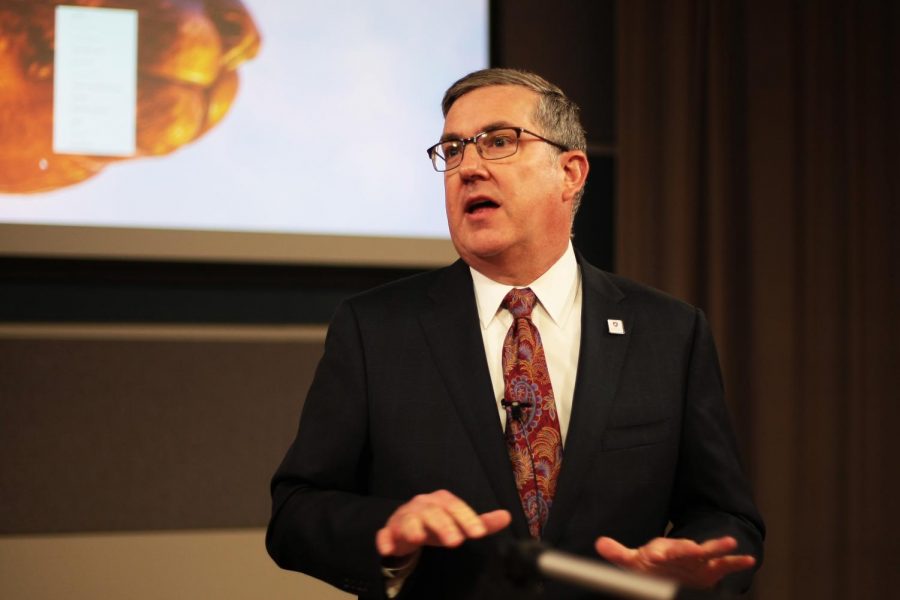Second virtual town hall covers COVID-19 updates
Students can request refund or credit for housing, dining; students, staff, faculty can ask for parking refund
BEN SCHUH | DAILY EVERGREEN FILE
WSU President Kirk Schulz said he believes the university will return to face-to-face instruction in the fall.
April 10, 2020
WSU officials discussed topics ranging from WSU employment, student aid and resources, academic deadlines and student living during a virtual town hall on Friday.
University faculty discussed changes to policies, where to find resources and what to expect for the future. They reviewed internal and external data that can be used to support students and staff.
WSU President Kirk Schulz said he believes the university will be back to face-to-face instruction in the fall.
The university does not know if there will be layoffs in the future, Schulz said. One of the university’s priorities is making sure jobs are preserved for people in the community.
“I want to emphasize again, this is not us knowing something and not wanting to share that,” he said. “We don’t know what the federal stimulus package is going to do for us [or] what the final impacts are on the state budget.”
Salary freezes are just for WSU executives and will not impact faculty promotions, Schulz said. There are discussions among executives and other highly compensated employees about voluntary salary reductions, such as coaches and athletic directors. There may be additional reductions in the future, he said.
WSU Interim Provost Bryan Slinker said students should reach out to their academic adviser when determining whether they should take a letter grade or pass/fail grade. He said circumstances vary between students and advisors can help them assess the situation.
There will be a longer grace period for students that want to withdraw from courses, Slinker said. He urged students to speak with their advisers and instructors to develop an academic strategy before withdrawing from courses.
“Let us know what would help you,” Slinker said. “At the end of the day, [if] you don’t see it working, then we’d liberalize the withdrawal time frames and work with you through the petition process.”
WSU’s graduate program is evaluating preliminary, qualifying and final exams for graduate students, he said. These programs will introduce flexibility relative to deadlines and delays. There are not university-wide policies that would dictate blanket changes, Slinker said, so there will be continued communication with Graduate Programs.
Mary Jo Gonzales, vice president of the Division of Student Affairs, said ASWSU leadership from all WSU campuses indicate the primary issues students are facing is being able to pay basic bills. She added that students can access the university’s emergency fund if they are struggling.
“Use these three words: I need help,” Gonzales said. “Tell us what you are looking for.”
Students have an option between getting a refund or credit for their housing fees. She said they can also donate the remainder of their RDA into WSU’s Cougs Feeding Cougs program. Students can also request food assistance through the program.
There is a group that is assessing how to help students access federal government aid, she said. The aid covers technology, childcare, housing, food and more.
Gonzales said the university apartments and residence halls are staying open until Gov. Jay Inslee says otherwise. Students who are living off-campus should speak with their landlords for additional information. She said WSU is communicating with these entities and telling them they should be flexible with residents given current circumstances.
Theresa Elliot-Cheslek, Human Resource Services vice president and chief human resource officer, said WSU employees should contact HRS or their employer if they are having trouble with their workload. There is aid available for employees that are impacted by the coronavirus pandemic, which can be found on the HRS website.
She said human resources is available to verify student employees’ tuition waiver so they can proceed with their classes. Employees should also be working with their supervisor on figuring out alternatives such as teleworking, working at an alternative work location or modifying their schedule, Elliot-Cheslek said.
Phil Weiler, vice president of marketing and communications, said all WSU campuses are working to secure venues for commencement in August. Once they find locations, the graduation ceremony dates will be released.
Weiler said the online celebration on May 9 will be about 45 minutes long and will feature student-focused content, rather than watching faculty provide remarks.
He said students, staff and faculty are urged to participate in the recruitment and selection of a new permanent provost. The pool consists of four finalists, who will each have an opportunity to present to the WSU community, Weiler said.
All presentations will occur from 1-2 p.m. and are scheduled for Monday, Tuesday, Wednesday and April 20. Weiler said people can submit questions in advance that they want candidates to answer. More information can be found on the provost search website.
Stacy Pearson, vice president for finance and administration, said it is too early to predict the fiscal impacts of the coronavirus pandemic.
WSU is on the third year of its fiscal recovery plan and went into a positive operating budget at the end of the 2019 fiscal year. Pearson said the university will be looking at how to manage expenses and revenues in the future.
She said WSU Finance and Administration is starting to model scenarios in terms of academic programming and impacts on facilities. They are doing this by drawing on information obtained through other universities, as well as what has been done in the past relative to finances.
Pearson also said students, staff and faculty can ask for a parking refund, which is prorated from the time they cancel it. More information regarding COVID-19 updates can be found on WSU’s COVID-19 website. The town hall can be watched here.










